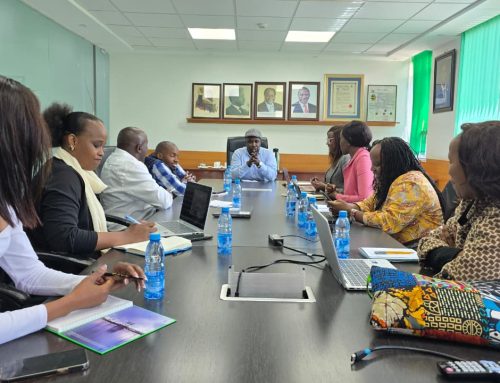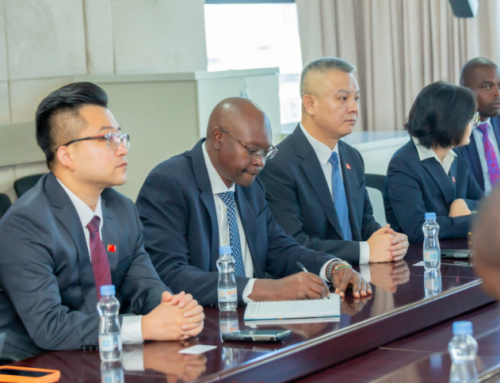The Kenya–China trade and investment opportunities are set for a spike with the pitching of business by Chinese companies in Nairobi, this week.At least 93 Chinese companies, 50 from industrial rich and China’s economic hub of Shandong Province are showcasing at the ‘ Kenya International Industrial Expo 2020 and Shandong Export Commodities Exhibition’ taking place at the Sarit Expo Centre.
The expo dates 26th November-28th November, has linked Chinese companies to their Kenyan counterparts, with major deals expected to be sealed.Potential partnership are in general machinery which include agricultural , construction , food-processing , packaging and textile machinery.
Other areas are building material, agriculture equipment , medical equipment, hardware and tools, electrical and new energy products and automobile and spare parts.The expo is organised by Afripeak Expo Kenya Limited in partnership with Kenya Investment Authority(KenInvest), Kenya National Chambers of Commerce and Industry(KNCCI) and the Kenya Association of Manufacturers(KAM), with the aim of driving industrialization transformation agenda.This year is the third edition of the expo where over 90 international exhibitors and 2,100 merchants’ professionals are showcasing.
Due to Covid-19 restrictions, the Expo has a combination of virtual and physical activities.KenInvest has since called on close collaboration between the two countries’ private sector and government to boost trade and investment.According to the authority, tasked with promoting investments in the country, Kenya has put in place a number of policy and tax incentives, attractive for Chinese investors to set up manufacturing plants to produce goods for local and export markets.“We are urging local enterprises to forge joint ventures with Chinese enterprises as way of growing their production capacity and tapping into their technology,” said Pius Rotich, General Manager, Investment Promotion at KenInvest.
Afripeak Expo Kenya Limited managing director Gao Wei has noted ‘high interest’ from Chinese companies to invest in Kenya, terming the country “ a strategic investment destination and getway to the East Africa region.”“It is an industrial hub where many Chinese firms are keen to invest in especially in machinery and industrial development,” Wei said.The expo, Wei said, sets a platform for further growth of trade and investment between the two countries, urging Kenyans to tap into the Chinese markets to grow their exports.
At least 400 Chinese firms have set base in the country with major focus on infrastructure, retail and real estate.Foreign Direct Investments (FDI) from China to Kenya are in excess of Sh84.1 billion in the last five years, hitting a high of $410.1 million(Sh44 billion) in 2017.The country remains one of the top FDI destinations in Africa, coming third in business volume and value, only after South Africa and Egypt.
Meanwhile, the private sector is keen to bridge the trade deficit between Kenya and China.
Trade is currently in favour of China with Kenyan imports valued at approximately Sh390 billion annually,against exports of around Sh11 billion, a ratio of 35:1.“We must engage in joint ventures with our Chinese counterparts in order to balance the trade. We can tap into the experience of Chinese enterprises to grow our local capacity,” KNCCI vice president Erick Rutto said.Kenya’s trade ministry has been working on reducing the huge deficit by securing more market for the country’s exports to the East Asian country.
This is mainly on agricultural products, riding on the Integrated National Export Development and Promotion Strategy, an export diversification plan unveiled in July 2018.According to Industrialisation, Trade and Enterprise Development Cabinet Secretary Betty Maina, the country is tightening phytosanitary requirements and conformity which will make more produces acceptable in the international markets.
“We are improving our competence which will ensure we have more access to markets,” CS Maina told the Senate Committee on Tourism, Trade and Industrialisation in a recent meeting.The country is keen to grow its exports of farm produce such as flowers, mangoes, french beans, peanuts, vegetables, meat, herbs, bixa and macadamia to China.In 2018, the two countries signed a food, plant and animal safety agreement that provides the framework for the export of fruit, vegetables, flowers and meat to China.
In April 2019, President Uhuru Kenyatta and President Xi Jinping signed a deal allowing Kenya to export Hass avocados.Meanwhile, Kenya is also eyeing multi-billion investments from China for the country’s Special Economic Zones(SEZs).Through Kenya Investment Authority (KenInvest), the government is marketing at least nine SEZs in Mombasa, Naivasha and Machakos with about 9,000 acres designated for investments.The government is leveraging on the SEZs as part of its plans to boost FDIs in post-Covid-19 economic recovery.SEZs are designated areas aimed at facilitating export–focused investments by both local and foreign investors.According to KenInvest managing director Moses Ikiara, the government has also set up 75 Export Processing Zones (EPZs)across the country, which come with “a lot of incentives for investors.”
It includes cheaper electricity tariffs of as low as at $5 cents (about Sh5) per kilowatt hour.This is lower compared to the traditional charges of between Sh10 and Sh15 per unit of electricity, which has been blamed for making Kenyan un-competitive.SEZs are also considered to be outside the customs territory of Kenya, and therefore operate in a jurisdictional that shields them from taxes and other regulatory bureaucracy.Tax incentives include exemption from paying, in part, excise duty, income tax, customs duty and value added tax on all special economic transactions by licensed SEZs enterprises, developers and operators established within the zones.“We encourage Chinese firms to invest in these special economic zones where we can have manufacturing and value addition investments,” Ikiara said.







Leave A Comment